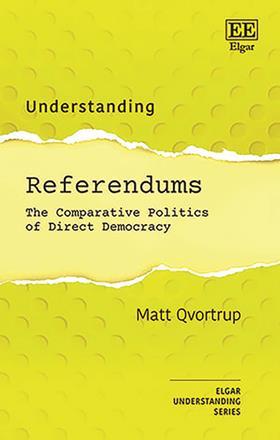Understanding Referendums: The Comparative Politics of Direct Democracy
Matt Qvortrup
£80, Edward Elgar
★★★★✩
It’s hard to imagine A V Dicey – archetypal Victorian gentleman scholar and intellectual godfather of the British constitution – and Carl Schmitt – critic of liberal democracy and the rule of law, and one-time defender of Nazism – would have much on which they would agree. The utility of referendums, apparently, would be one thing. For Dicey, referendums are a ‘People’s Veto’, capable of placing a brake on the otherwise unlimited powers of a sovereign parliament. For Schmitt, referendums were manifestations of the ‘volkssouveränität’, legitimising the government’s acts by lending them the imprimatur of ‘the People’s Will’.
I confess, I have never really considered referendums much – unless you count the issue of whether the plural is referendums or referenda – but professor Qvortrup’s book convinced me that this lack of interest was a mistake.
Describing the work as ‘a stock-take after 25-plus years writing about all aspects of referendums’, Qvortrup addresses two myths;
- Referendums are bottom-up institutions; and
- Referendums are likely to slide towards unfettered populism.
Both have some truth.
His clear and pithy summary considers how referendums have been used by the public to promote or repeal unpopular laws – a legal right in Switzerland and Italy – or protest a policy they disagree with, while they support the government on other matters. He gives the 2014 Scottish Independence Referendum as an example. He also notes how often political elites use them to legitimise an ideological agenda, or break parliamentary deadlock – a technique much loved by post-war Italian governments. There might also be the desire to gain an electoral advantage, such as the Brexit referendum, or get the electorate to settle a dispute between uneasy coalition partners – for example, the UK’s referendum on changing the parliamentary voting system in 2011.

In short, referendums can be both Diceyan and Schmittian; populist and elitist; bottom-up and top-down. They are, however, at their heart, manifestations of democracy in its classical sense – ‘rule by the people’.
Qvortrup’s style is easy-going and conversational, yet the scholarship is rigorous. His own views are not necessarily neutral. At one point, after defining ‘plebiscite’ as the kind of referendum Schmitt would have approved, he makes cheeky reference to the ‘Brexit plebiscite’, although I think this can be forgiven.
All told, a great introduction and foundation for further reading.
James E Hurford is a solicitor at the Government Legal Department, London































No comments yet